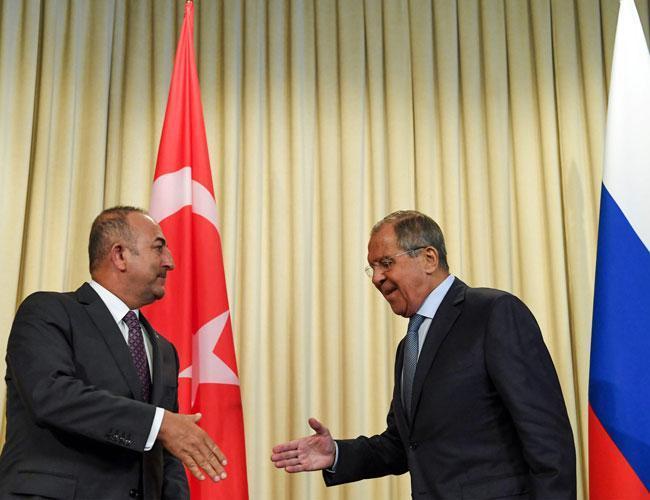
Turkish and Russian top diplomats on Aug. 24 discussed solutions to the situation in Syria’s last rebel-held province of Idlib, with Turkish Foreign Minister Mevlüt Çavuşoğlu warning that seeking a military solution would lead to disaster.
“A military solution there will cause catastrophe,” Çavuşoğlu said at a press conference with his Russian counterpart Sergei Lavrov.
“Not only for the Idlib region but for the future of Syria, it will cause catastrophe and the clashes may last a long time.”
“Separating the civilians from the combatants in Idlib is important for everyone, but a solution through force would lead to a new wave of refugees and a humanitarian catastrophe,” he warned.
“A solution by force in Idlib would undermine the trust between Russia and Turkey as well as the trust of the cease-fire participants.”
“It is necessary to work in the Astana format on the [existing] cease-fire, it is necessary to work on promoting the political process,” Çavuşoğlu added, referring to the process that began in Astana, Kazakhstan.
Speculation is increasing that there could be a Russian-backed government assault on the northwestern province, home to Syria’s last major rebel stronghold.
Çavuşoğlu said that Turkey nevertheless considers “it is very important that those radical groups, terrorists are rendered ineffective.”
“It’s also important for Turkey because they are on the other side of our border. They pose a threat to us first.”
Russian President Vladimir Putin met with the Turkish and Russian defense and foreign ministers, and the intelligence chiefs on both countries, on Aug. 24.
In a brief statement before starting the meeting, which was closed to the press, Putin said Russia’s relations with Turkey “are both deepening and thriving, and our cooperation on regional and economic issues are increasing.”
The jihadist Hayat Tahrir al-Sham (HTS) alliance controls around 60 percent of Idlib, which borders Turkey, while other Turkey-supported rebel groups hold most of the rest.
Idlib is one of the so-called “de-escalation” zones set up by Russia, Turkey and Iran last year.
Analysts say any regime offensive will probably be limited to a small area of Idlib, with a deal between Russia and Turkey likely to determine the fate of the rest of the province.
Russian Foreign Minister Lavrov said on Aug. 24 that the situation was “multi-faceted” and called for separating out “the healthy opposition from terrorist structures.”
“When the de-escalation zone was created in Idlib, no one proposed using it for terrorists to hide behind the civilian population like a human shield.
“Especially as they aren’t just lying low there. Raids constantly come from there and firing on the positions of the Syrian army.”
He said he was sure Turkish and Russian presidents would “talk in detail on this topic.”
Çavuşoğlu also said the political process in Syria should be started as soon as possible.
Stating that a list of member candidates for a constitutional committee was summited, Çavuşoğlu said: “Establishing a constitutional committee immediately is important for Syria’s future. We back this process.”
Meanwhile, Russia and Turkey have agreed to establish a mechanism to restore a visa-free regime between the two countries, Lavrov also announced.
Russia is ready to lift visa restrictions for the Turkish holders of special and service passports as well as for drivers engaged in cargo transportation between the two countries, Lavrov said.
“We have confirmed Russia’s readiness to hold talks on simplifying the travel regime for certain categories of Turkish citizens on a reciprocal basis, and we will do this in the near future,” said Lavrov.
“We agreed to establish a mechanism for consultations on the development of agreements on this subject.”
Calling Russia a “strategic partner,” Çavuşoğlu stressed the importance of further developing bilateral ties with Russia.
“We will both improve bilateral relations between the two countries for [providing] stability and economic development in the region and we will boost our cooperation on regional matters,” he said.
Without naming any country, he said that some countries and individuals were jealous of Turkey and Russia’s close cooperation and friendship.
Çavuşoğlu also expressed pleasure at the growing number of Russian tourists visiting Turkey.
“We will be very happy to welcome some 6 million of our Russian friends to our country this year,” he said.
2019 will be declared the Year of Culture and Tourism between the two countries, Çavuşoğlu said, expressing hope that this will serve to attract even more Russian tourists.
250,000 Syrians may flee to Turkey from Idlib: Turkish intelligence

Turkish defense minister, intelligence chief in Russia to discuss Syria’s Idlib
